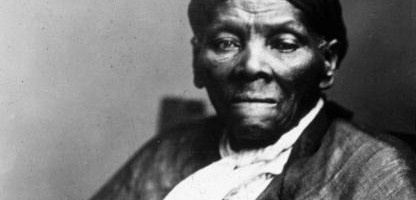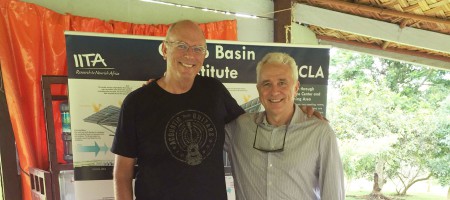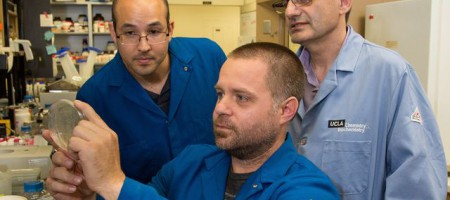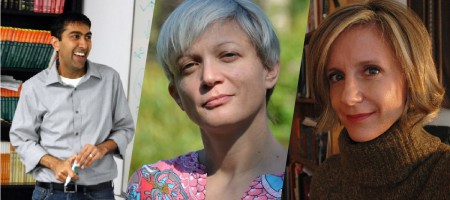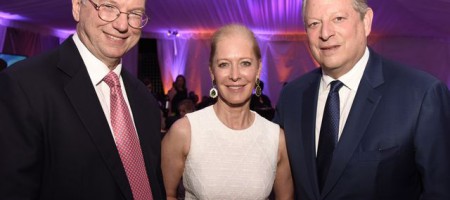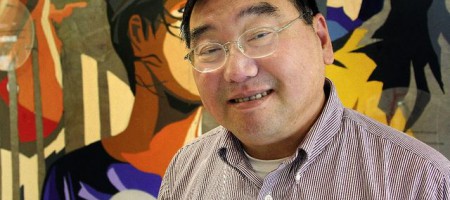World-renowned guitar maker Bob Taylor, of Taylor Guitars, has donated $400,000 to support ebony conservation research and restoration efforts in Cameroon.
Work will be coordinated by UCLA professor Thomas B. Smith, co-director of Congo Basin Institute, UCLA’s first foreign affiliate in its 97-year history. The gift was announced at th star-studded fundraising gala in March hosted by UCLA’s Institute for the Environment and Sustainability (IoES).
Ebony is an exotic but endangered species coveted for the beauty and tonal qualities of its wood, making it a sought-after material for guitars and other stringed instruments.
“Making a difference in central Africa is very hard. Bob is making a difference at the nexus of poverty alleviation and conservation, and along the way he is creating jobs, supporting cutting edge science, and being a terrific partner for IoES and UCLA,” said Peter Kareiva, director of the IoES.
Bob Taylor made his first guitar at the age of 16. A few years later, in 1974, he founded Taylor Guitars with business partner Kurt Listug. Now a world-leading builder of premium acoustic guitars, the company produces hundreds of guitars a day and has an artist roster that includes stars like Taylor Swift, Prince, Jason Mraz and Zac Brown.
Taylor Guitars had long been committed to eco-conscious practices. About five years ago, Taylor began visiting Cameroon and saw firsthand not only the depleted state of the ebony forests but also the impoverished conditions of its people. In 2011, the company partnered with Madrid firm Madinter, which sells tone woods for musical instruments, to buy CRELICAM, Cameroon’s leading ebony sawmill, in a move to transform the ebony trade for the better and engage the community in the process. The mill now employs more than 70 people and continues to invest in the community’s future through employee training and the exploration of ebony propagation, including an onsite seedling nursery.
“We’ve accomplished much over the five years we’ve been in Cameroon, first by elevating the income of our employees, then training suppliers, adding equipment for greater yield, leaving more money in the country, all the while increasing legality and transparency in the forest,” Taylor said. “Now it’s time to plant trees in a meaningful way, but little is known about how to do it.”
It was on one of his trips to Cameroon that Taylor met Smith, director of the Center for Tropical Research at IoES and professor in the Department of Ecology and Evolutionary Biology in the UCLA College. Smith has been conducting biodiversity and conservation research in the Congo basin for 35 years.
According to Smith, the ecology of West African ebony remains poorly understood despite its economic importance.
“Thanks to Bob Taylor, the Congo Basin Institute is thrilled to help bring the best possible science to promote the sustainable harvest of ebony,” Smith said. “Bob cares deeply about the future of ebony and African hardwoods generally. The project is a true ‘win-win’ for people and for biodiversity.”
Taylor’s gift will fund a multi-pronged effort that includes engaging local farmers to propagate and steward ebony seedlings in rural areas; creating predictive models of West African ebony distribution and identifying suitable harvesting and planting areas; research on the basic ecology of ebony; and lab testing to identify optimal conditions for ebony cultivation.
“We must expand the range of ebony in the Congo Basin,” Taylor said. “It’s the right thing to do, and Congo Basin Institute is able to develop the science to assure the work is successful. With viable regrowth and conservative use, we can help to achieve sustainability.”


